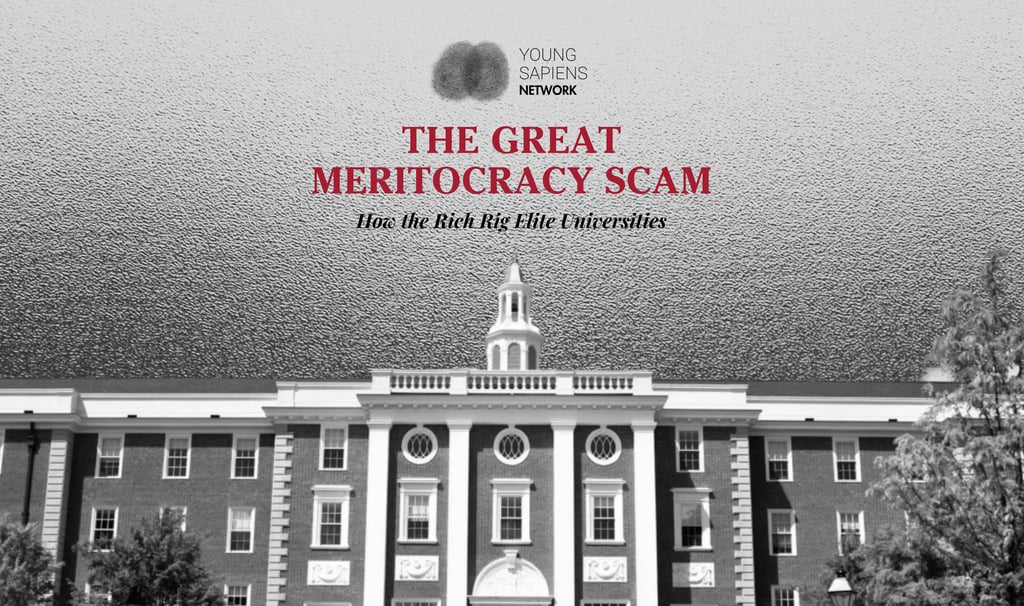The Great Meritocracy Scam: How the Rich Rig Elite Universities
Sashwat Pandey
3/28/20253 min read
For decades, elite universities like Harvard, Oxford, and their peers have proudly positioned themselves as bastions of meritocracy. They project a world where hard work, brilliance, and ambition are rewarded—where anyone, regardless of background, can rise to the top. But peel back the glossy brochures and PR campaigns, and a darker truth emerges: the gates to these institutions aren’t just guarded by exam scores and personal essays—they’re propped open for the privileged.
The Illusion of Meritocracy
Meritocracy is the ideal. But in reality, it’s often a myth—one carefully maintained to protect the status quo. The numbers are hard to ignore: wealthy students dominate the admissions rosters of the world's most revered universities. What’s being sold as "merit" is frequently a reflection of generational wealth, elite schooling, private tutoring, and social networks. So, the pressing question becomes: are these institutions selecting the most talented, or merely the most advantaged?
Harvard—A Case Study in Elitism
Harvard University is often seen as the pinnacle of academic achievement. But the socioeconomic composition of its student body paints a more troubling picture. A staggering 67% of Harvard students come from families in the top 20% of earners, while only 4.5% come from the bottom 20%. Even more startling, children of the top 1% are more than twice as likely to gain admission compared to their middle-class peers.
And then there's the legacy factor. If your parent went to Harvard, your acceptance rate skyrockets to 33%, compared to a mere 6% for those without legacy status. It’s not just about who you are—it’s about who your parents are, who they know, and what they can give.
Oxford—The Fortress of Privilege
Across the Atlantic, Oxford tells a similar story. In 2023, only 21.2% of its UK student intake came from disadvantaged backgrounds. Private school students, though they make up just 7% of the UK’s schoolchildren, received over half (52.2%) of all offers.
The dominance of a handful of elite feeder schools—Eton, Westminster, and St. Paul’s—makes it clear that Oxbridge isn’t just selecting talent; it's recycling privilege. These schools send more students to Oxford and Cambridge than thousands of state schools combined.
The System Works—Just Not for Everyone
The reality is simple: the system works, but it works best if you’re rich.
From high-end tutoring to polished extracurriculars, elite internships to well-connected referees, wealthy students are equipped with every advantage. Admissions policies—whether through legacy preferences, private schooling, or subtle biases—consistently tilt the scales in their favor. The result? A self-reinforcing cycle of inherited opportunity that elite universities are complicit in sustaining.
Redefining Merit: Time for a Reckoning
If these universities genuinely want to uphold the values of equity and excellence, they must confront the uncomfortable truths within their walls. Here’s where the change must begin:
Abolish legacy admissions. Family connections should not determine academic futures.
Expand outreach and support. Diversity shouldn’t be a checkbox—it should be a commitment to creating opportunity.
Contextualize applications. Evaluate students not just by what they achieved, but what they overcame to achieve it.
Demand accountability. Universities must be transparent about who gets in, and why.
The myth of meritocracy at elite universities serves a purpose—it protects privilege while appearing fair. But if we are serious about creating just and equal societies, we need to call it what it is: a scam.
So, let’s ask ourselves—are these institutions truly nurturing the world’s best and brightest? Or are they simply finishing schools for the children of the rich?
It’s time to stop celebrating the illusion and start demanding a system where merit means more than money.


Revolutionising Youth Media.


